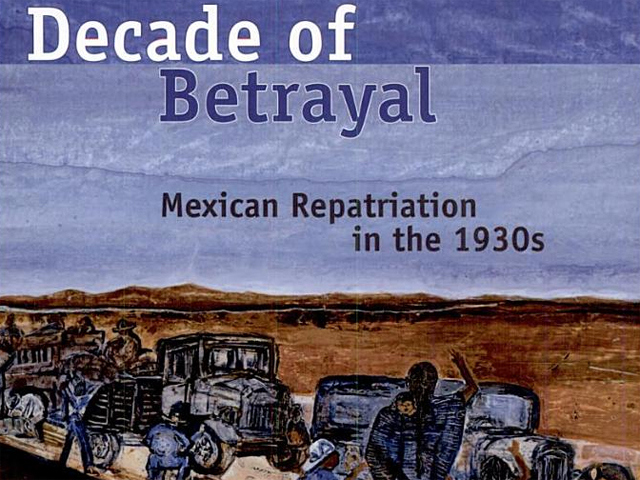Author of book about mass Mexican deportation in the 1930s dies, but legacy continues

 By Kristina Puga, NBCLatino
By Kristina Puga, NBCLatino
Jorge-Mario Cabrera remembers reading about the estimated 1 million Mexicans and Mexican-Americans deported or scared into leaving their homes in the U.S. by government officials trying desperately to improve the economy during the Great Depression of the 1930s in the book, “Decade of Betrayal,” by Raymond Rodriguez and Francisco Balderrama.
It was the mid-1990s, the book had recently hit shelves, and Cabrera says it was required reading at the University of California at Santa Cruz where he was a community studies major. The co-author, Raymond Rodriguez, recently passed away on June 24 from a heart attack at age 87, but his legacy still strikes a chord in Cabrera, who is of Salvadoran descent, as well as in other immigrants today.
“I thought this could not have happened in my America — in a place that valued justice, freedom and the pursuit of happiness,” says Cabrera, director of communications at theCoalition for Humane Immigrant Rights of Los Angeles (CHIRLA). “Mr. Rodriguez represents a member of the Chicano canon of writers that really brought to light who Latinos were. For many Americans, the book might have been an introduction to this emerging ethnic group.”
Rodriguez, who formerly worked as a Long Beach City College administrator and columnist for the Long Beach Press-Telegram, was a lover of his community and strove to eradicate ignorance of Latinos and the deportations.
“Americans, reeling from the economic disorientation of the depression, sought a convenient scapegoat. They found it in the Mexican community,” Rodriguez and co-author Francisco Balderrama wrote in the 1995 book.
According to the Los Angeles Times, the book ignited legislative hearings and apologies from the state of California and Los Angeles County officials for their actions — what they called “repatriation.”
“It is no exaggeration to say that without the scholarly work by Ray and Francisco, no one but a handful of individuals would ever know about the illegal deportations of Mexican Americans in the 1930s,” said former state Senator Joseph Dunn (D-Santa Ana).
Rodriguez had lost his own father when he was only 10 due to the deportations, and later found that approximately 60 percent of the deported were U.S. citizens. Officials rounded up Mexican immigrants and their families at dance halls, stores, hospitals, theaters and parks, loaded them onto vans and trains and transported them to Mexico.
“If anything, his book was a red flag to what could happen,” says Cabrera. “The new wave of immigrants are doing about the same thing — contributing to their new home even though they don’t have the paperwork.”
Cabrera further explains that something like that huge expulsion of Mexicans would be unthinkable today, yet we are reminded that during the past the last decade, more than 4 million immigrants have been deported.
“Many of those have sons and daughters who are U.S. citizens,” says Cabrera. “The numbers are staggering. Many have roots in this country and have been deported, and many seem to not blink an eye about it…In terms of the ongoing immigrant debate, it’s important to look at history and make sure we don’t repeat it.”
Cabrera also remembers the internment of 110,000 Japanese and Japanese Americans on the West Coast.
“It happens any time the U.S. gets fidgety with immigrants,” he says. “I think we come back and reason and do the right thing, but we’re at that point where extremists in government want to hear none of it. Mr. Rodriguez showed us that that’s not the answer. In fact, that’s a bad answer.”
“That book will be with us a long, long time.”
This article was first published in NBCLatino.
Kristina Puga, Web Producer: A graduate of Barnard College and The Columbia Graduate School of Journalism, Kristina is the product of an Ecuadorian father and a Russian mother. Raised in culturally diverse Queens, NY, she has been covering the Latino community for about a decade for publications such as the New York Daily News, AOL Latino, NYRemezcla.com, and Urban Latino. She loves to travel and experience different foods and cultures while discovering interesting characters along the way and telling their stories. After a long stay in Oaxaca, Mexico, she now considers it her second home. According to legend, she will be back since she ate chapulines there.
[Cover art by University of New Mexico Press]
